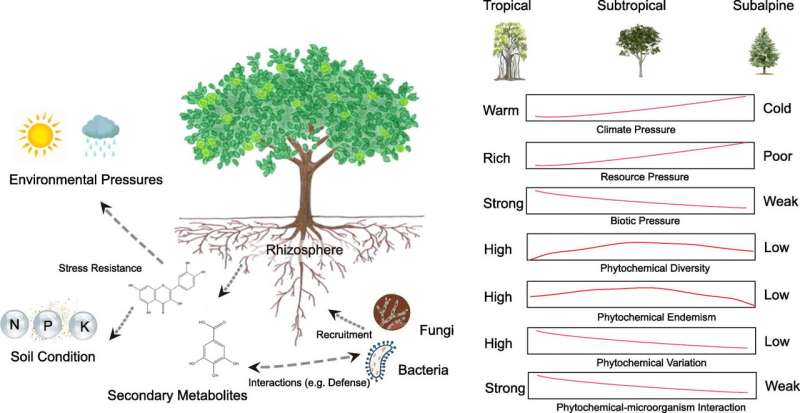This article has been reviewed according to Science X's editorial process and policies. Editors have highlighted the following attributes while ensuring the content's credibility:
fact-checked
peer-reviewed publication
trusted source
proofread
How phytochemical diversity affects plant adaptation to stress

Phytochemical diversity plays a critical role in determining plant adaptation and fitness, as well as ecosystem functions and services. However, phytochemicals and their ecological adaptations have long been ignored. Fine (or absorptive) roots, microorganisms, and soil form the complex interface known as the rhizosphere. However, the variation in fine root chemistry along large-scale environmental gradients remains poorly understood.
In a study published in Science of the Total Environment, researchers from the Xishuangbanna Tropical Botanical Garden (XTBG) of the Chinese Academy of Sciences investigated the phytochemical diversity and its adaptation to abiotic and biotic stresses along different climatic gradients. By delving into the chemical constituents in fine roots, they sought to understand how these chemical constituents help plants cope with various environmental stresses.
The researchers aimed to explore the trends in the complexity of phytochemical composition (alpha diversity) and the variation in composition (beta diversity or endemism) and their relationships with microorganisms along environmental gradients. They measured the untargeted metabolomics of fine roots and the rhizosphere microbiome of 315 tree species along a macro-climatic gradient spanning tropical, subtropical, and subalpine region.
The results showed that the chemical diversity of subalpine tree species was higher than that of tropical tree species, but the variation in chemical diversity was smaller, which is conducive to adaptation to higher abiotic stress. Tropical tree species had higher variation in chemical diversity and chemical endemism, which is conducive to species coexistence and adaptation to complex biological stress.
In addition, there was extensive chemo-ecological niche differentiation among closely related tree species in all climate zones, and fine root chemical diversity was weakly influenced by phylogeny and mainly regulated by abiotic and biotic stresses.
"Our study is a positive exploration of phytochemical diversity patterns and their interactions with rhizosphere microorganisms along climatic gradients, which highlights the importance of future phytochemical research," said Yang Jie of XTBG.
More information: Yazhou Zhang et al, Phytochemical diversity and their adaptations to abiotic and biotic pressures in fine roots across a climatic gradient, Science of The Total Environment (2024). DOI: 10.1016/j.scitotenv.2024.172051
Journal information: Science of the Total Environment
Provided by Chinese Academy of Sciences




















